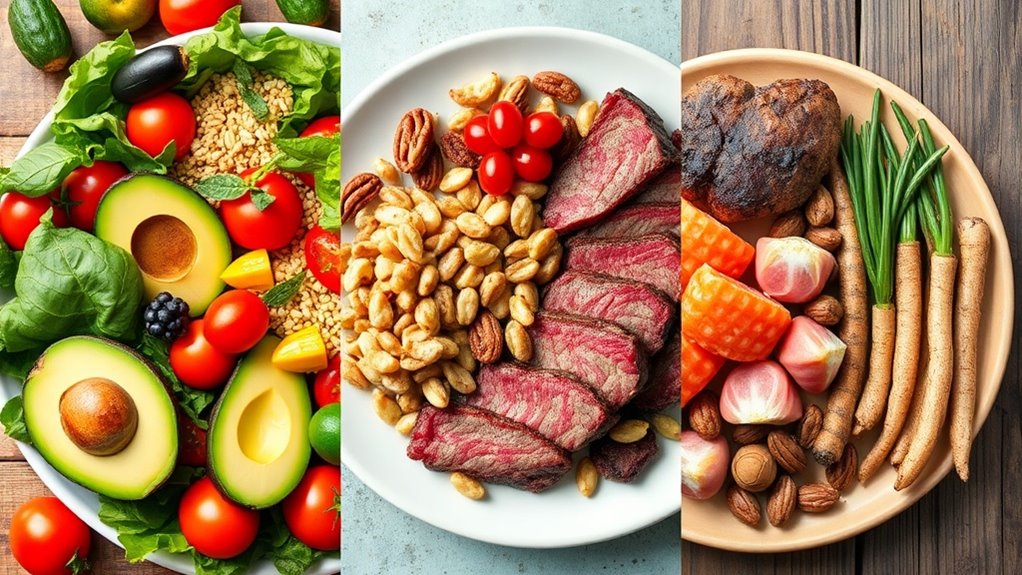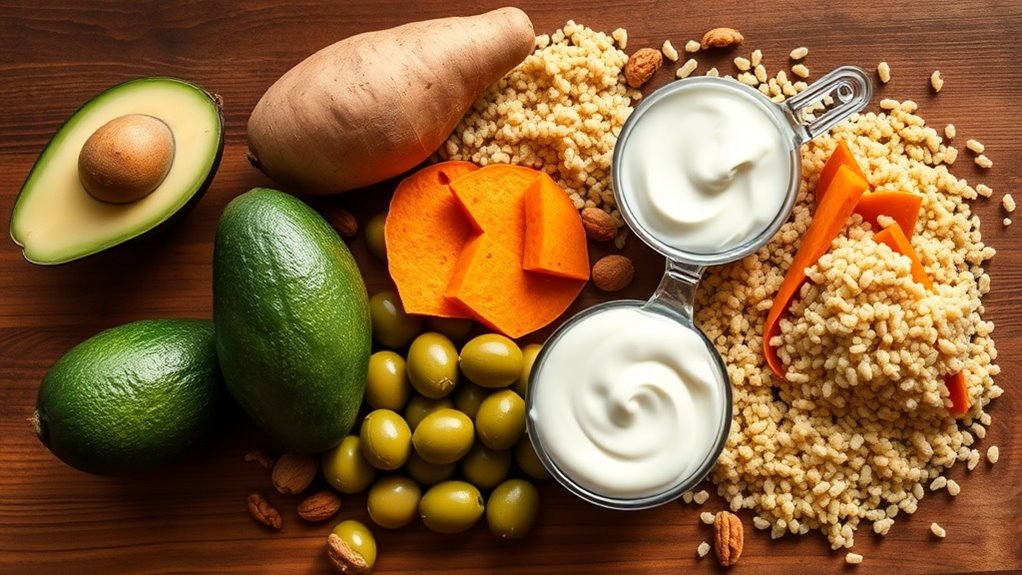Keto Vs Paleo Vs Vegan- Which Diet Wins for Fat Loss.
Navigating the world of diets can feel like walking through a maze, especially when you aim for fat loss. The Keto, Paleo, and Vegan diets each offer unique benefits, but how do they stack up against one another? Understanding their principles and nutrient compositions is essential to determine which might best fit your lifestyle and goals. Let’s explore these options and uncover the nuances that might lead you to the best choice for your health journey.
Overview of the Keto Diet
The ketogenic diet, often called the keto diet, is a low-carbohydrate, high-fat eating plan designed to shift your body into a state of ketosis.
In diet comparisons, keto emphasizes drastically reducing carbs, which can lead to rapid weight loss.
While effective for some, it may not suit everyone. Professional consultation recommended can help ensure tailored plans and sustainability when determining if keto is right for you.
Key Principles of the Paleo Diet
The Paleo diet emphasizes a return to whole foods, encouraging you to eat like our ancestors did. This means avoiding processed ingredients and prioritizing natural fats, which can support overall health and fat loss. Additionally, focusing on whole foods that are nutrient-dense can enhance satisfaction and help reduce overeating.
Whole Foods Focus
While you explore dietary options for fat loss, embracing the Paleo diet’s whole foods focus can significantly impact your health.
Avoid Processed Ingredients
To successfully adopt the Paleo diet, you’ll want to steer clear of processed ingredients that can undermine your health goals.
These foods often contain additives, refined sugars, and unhealthy fats that can hinder fat loss and disrupt your metabolism.
Natural Fats Emphasis
Emphasizing natural fats is a cornerstone of the Paleo diet, recognizing that not all fats are created equal.
You’ll focus on unprocessed sources like avocados, nuts, and olive oil, which provide essential fatty acids and support healthy hormonal function.
Research shows that when incorporated mindfully, these fats can aid in weight loss and promote overall health, making them a valuable part of your dietary strategy.
Fundamentals of the Vegan Diet
If you’re considering a vegan diet for fat loss, it’s important to understand its fundamental principles.
This diet focuses on plant-based foods, emphasizing fruits, vegetables, whole grains, legumes, nuts, and seeds. It excludes all animal products.
A well-planned vegan diet can provide ample nutrients while potentially promoting weight loss through lower calorie density and increased fiber intake, fostering satiety and overall health. Additionally, incorporating healthy fats from sources like nuts and seeds can further enhance satiety and support metabolism.
Comparing Macro Nutrients in Each Diet
When evaluating the macro nutrient profiles of the keto, paleo, and vegan diets, it’s essential to recognize how each approach prioritizes different sources of energy.
Keto focuses on high fats, moderate proteins, and low carbohydrates, while paleo emphasizes whole foods with balanced proteins, fats, and carbs.
In contrast, vegan diets rely heavily on plant-based carbohydrates, paired with protein sources like legumes and grains. Additionally, incorporating whole foods into any diet can help stabilize insulin levels and support hormonal balance.
Analyzing Scientific Studies on Fat Loss
While numerous studies have explored the effectiveness of low-carb and plant-based diets for fat loss, it’s crucial to understand the nuances behind these findings. Research shows that both keto and paleo can lead to short-term weight loss due to reduced carbohydrate intake, while vegan diets often emphasize whole foods, potentially fostering sustainable habits. Each diet’s success can depend on individual adherence and lifestyle factors. Furthermore, the benefits of whole, nutrient-dense foods play a significant role in maintaining satiety and supporting a healthy weight loss journey.
Personalizing Your Diet for Best Results
When personalizing your diet for fat loss, it’s essential to consider your individual nutritional needs and preferences. Your lifestyle plays a crucial role in determining which diet will be sustainable in the long run. Understanding hormonal effects can lead to not just short-term success, but lasting results.
Individual Nutritional Needs
Individual nutritional needs play a crucial role in determining the most effective diet for fat loss.
You should consider factors like age, sex, activity level, and any underlying health conditions. Tailoring your approach ensures you’re meeting your body’s unique demands.
For instance, if you’re more active, you might require additional carbohydrates, while those focused on fat loss may benefit from lower carb intake.
Lifestyle and Preferences
Understanding your unique nutritional needs is just the beginning; lifestyle and preferences play a significant role in your diet’s success.
Consider your daily schedule, cooking habits, and personal food likes and dislikes. If you enjoy your meals and can easily incorporate them into your routine, you’re more likely to stick with a plan.
Tailor your diet to fit your life for optimal fat loss.
Sustainable Long-term Choices
Choosing a sustainable diet for long-term fat loss hinges on personalizing your nutrition to fit your individual needs and goals.
Evaluate your habits, preferences, and health conditions when selecting between keto, paleo, or vegan. Ensure you maintain balanced macronutrients and prioritize whole foods.
Research shows tailored approaches enhance adherence, resulting in better outcomes. Consistency over time is key for lasting success.




